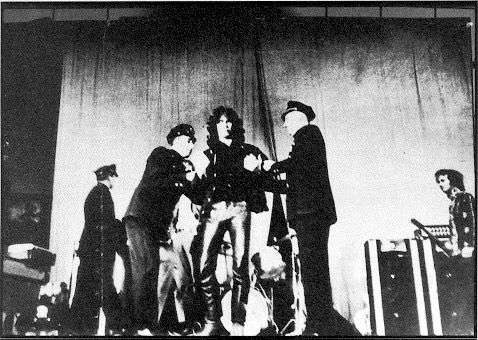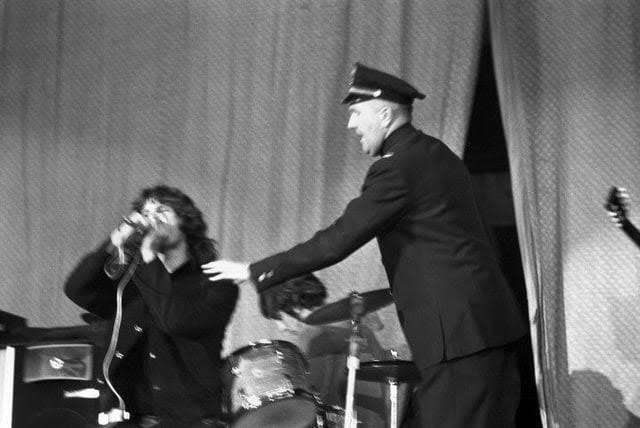
On December 9, 1967, rock history was made in New Haven, Connecticut, when **Jim Morrison**, the charismatic and volatile frontman of **The Doors**, became the first major rock star ever to be arrested **in the middle of a live performance**. What began as a routine concert at the New Haven Arena quickly spiraled into chaos, cementing Morrison’s image as both a rebellious poet and a lightning rod for controversy.
The Incident Begins Backstage
The night’s trouble began before The Doors even took the stage. While backstage with a young woman, Morrison was approached by a police officer who, not recognizing the rock star, ordered him to leave the area. Morrison protested, sparking an argument. The confrontation escalated when the officer pulled out a canister of mace and sprayed Morrison in the face. Temporarily blinded and furious, Morrison had to recover before the show could proceed.
The band considered canceling the performance, but Morrison, never one to shy away from confrontation, insisted on going on. What followed was less a traditional concert than an explosive confrontation between Morrison, the authorities, and the audience.
The Arrest on Stage
Once on stage, Morrison began recounting the incident to the crowd, vividly describing how he had been maced by a police officer. His words, laced with profanity and dripping with disdain, ignited the audience. As Morrison continued, he shifted from narration into provocation, taunting the officers present and mocking their authority.
The tension quickly reached its breaking point. Police officers stormed the stage, cutting Morrison off mid-performance. Before the stunned audience, he was arrested for **breach of peace, indecent and obscene language, and resisting arrest**. Fans erupted in outrage, some jeering at the police while others surged forward in disbelief.
The scene was unprecedented: a rock star being physically dragged off stage under arrest in front of his audience. For Morrison, it was both a humiliation and, paradoxically, a badge of honor that reinforced his reputation as the “Lizard King” — unpredictable, defiant, and unafraid of authority.
The Aftermath
The arrest sent shockwaves through the music world. Newspapers the following day were filled with accounts of the wild night, painting Morrison as either a reckless instigator or a victim of police brutality, depending on the source. For The Doors, it was one more step in their evolution from rising stars to cultural lightning rods.
Morrison’s arrest in New Haven foreshadowed later clashes between rock musicians and authorities, but his case stood out because of its setting. Unlike other arrests that happened offstage or after the fact, Morrison’s bust took place in the glare of stage lights, mid-performance, with thousands of fans watching.
The charges against Morrison were relatively minor, but the incident added fuel to his growing legend. He had already cultivated a reputation for testing boundaries with his lyrics, stage antics, and unpredictable behavior. The New Haven arrest confirmed what fans and critics alike suspected: Morrison wasn’t just performing rebellion — he was living it.
A First in Rock History
While Morrison would face more legal troubles later in his career — most infamously the 1969 Miami concert where he was accused of exposing himself — the New Haven arrest remains a landmark moment in music history. It marked the first time a rock frontman was hauled off stage by police during a show, symbolizing the growing tension between the counterculture and authority figures of the late 1960s.
The image of Jim Morrison being arrested on stage endures as a powerful symbol of rock and roll’s collision with the establishment. It encapsulated the era’s volatility — a time when music wasn’t just entertainment but a battleground for freedom of expression, generational identity, and rebellion against authority.
More than 55 years later, the story of that December night in New Haven continues to echo, not just as a curious footnote in Morrison’s turbulent career, but as a defining moment in the history of rock music itself.
Leave a Reply